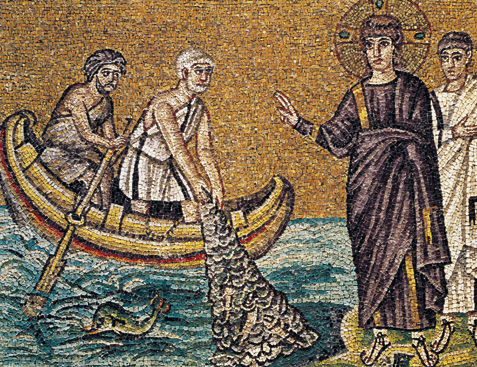Image Details

Scala/Art Resource, NY
Jesus’ outstretched hand seems both to beseech and to bless as he entreats Peter and Andrew to follow him and “become fishers of men” (Mark 1:17) in this mosaic of “The Calling of Saints Peter and Andrew,” from the Church of Sant’Apollinare Nuovo, in Ravenna, Italy.
The Gospels draw frequently upon the symbolism of fish and fishermen: Jesus’ food of choice when feeding the multitudes was, not surprisingly, fish, and Matthew describes a heavenly kingdom that sorts its catch of good and bad fish, thereby intimating the Last Judgment.
Our knowledge of Jesus rests largely on the disciples’ testimony, and the historical reliability of the gospel traditions about Jesus hinges on this question: Were the Twelve “uneducated, common men”? Their presumed naiveté is, writes Jerome Murphy-O’Connor, “a linchpin of the skepticism of those who attack the general reliability of the gospel traditions.” He notes that while the New Testament tells us little directly about Simon Peter, Andrew, James and John, we can learn just what sort of men they were by examining the role of fishermen in ancient times.
